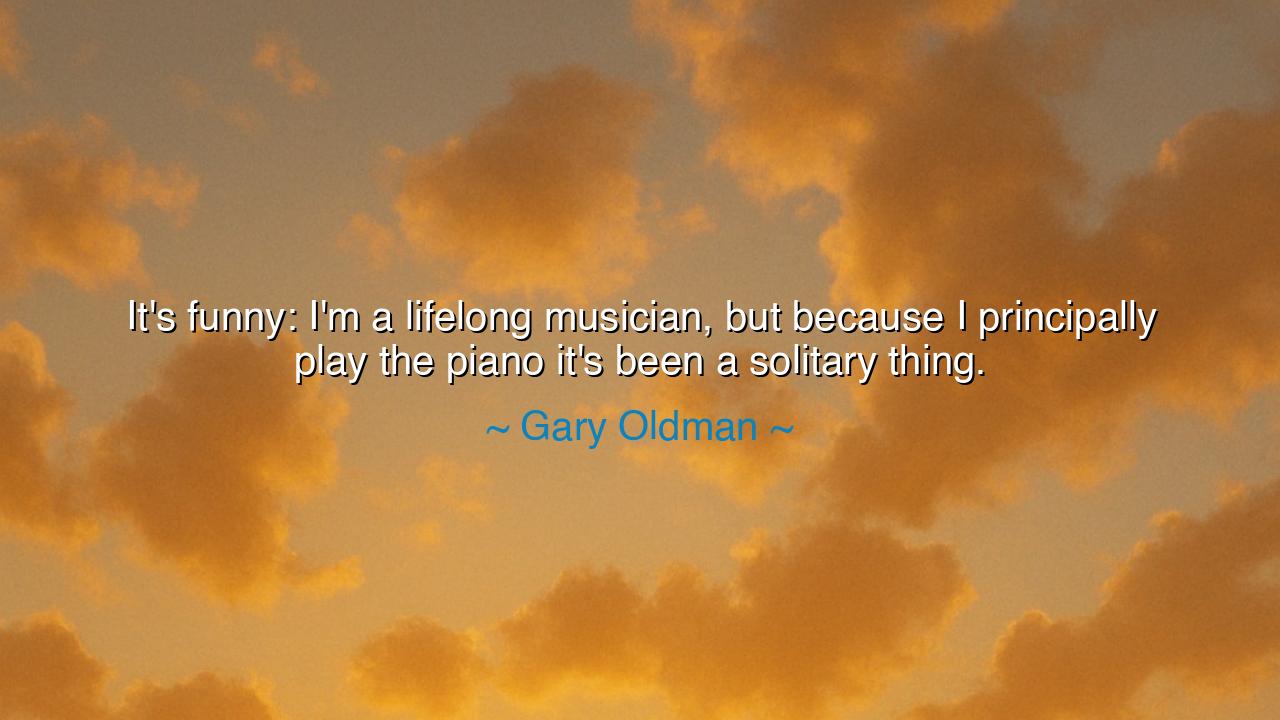
It's funny: I'm a lifelong musician, but because I principally
It's funny: I'm a lifelong musician, but because I principally play the piano it's been a solitary thing.






“It’s funny: I’m a lifelong musician, but because I principally play the piano it’s been a solitary thing.” — so spoke Gary Oldman, the master of transformation, whose voice and visage have taken a thousand forms upon the screen. Yet here, he speaks not as an actor, but as a man, and as an artist in solitude. In his words lies the ancient tension between creation and isolation, between the sweetness of mastery and the loneliness it can bring. His tone is reflective — tender, not bitter — for he has glimpsed the strange truth that the path of art often leads inward, into the chambers of one’s own soul.
The piano, that grand and solemn instrument, has long been both a companion and a confessor. It speaks with the voice of one, not many. Unlike the flute in the orchestra or the drum in the procession, the pianist sits alone before the keys, communing not with others, but with silence. And yet, from that silence rises a world of sound — a private universe made audible. When Oldman calls his art “a solitary thing,” he does not lament it; he recognizes the sacred solitude from which creation is born. The ancients, too, understood this. The poet withdrew into caves to hear the whisper of the gods. The philosopher walked alone beneath the moon to discern truth. For all who create, solitude is both exile and sanctuary.
There is something profoundly human in the irony he names — “It’s funny...” he begins, as though smiling at the paradox of his own condition. Humor here is humility. It is the laugh of the sage who has learned that all things precious come at a price. To play the piano, to master its voice, is to accept a life of quiet communion — fingers speaking where words cannot, music answering where no friend may reach. The ancients might have said he plays not for applause, but for eternity, conversing with that unseen audience which is the soul itself.
Consider the tale of Ludwig van Beethoven, who, though surrounded by the brilliance of Vienna, lived his deepest years in silence. As his hearing faded, the outer world receded, and yet within that silence he heard the symphonies of the divine. Cut off from all others, he became a vessel for the universal. His was the perfect example of Oldman’s reflection — that solitude, though heavy, can open the gates of the infinite. For when one walks alone with art, one walks not in emptiness, but in the presence of what the ancients called the daimon — the guiding spirit of creation.
And yet, Oldman’s confession reminds us that even the most gifted feel the ache of separation. To be a lifelong musician and yet feel alone is to live between worlds: one foot in the realm of human company, the other in the deep ocean of inner sound. The piano becomes both companion and mirror. It reflects the heart, but cannot embrace it. Many great creators have known this same sorrow — that their closest confidant is their craft, their truest friend a discipline that can neither speak nor listen. But in this paradox lies the glory of the artist: that through solitude, he gives voice to all.
The ancients would have taught that this solitude is not a curse, but a calling. The black and white keys, like the light and shadow of life, require both hands, both extremes. To sit at the piano alone is to practice the same art as the monk in his cell or the poet by his candle — the art of listening inward. The world today fears such solitude, for it mistakes noise for life and company for meaning. But as Oldman’s words remind us, the true musician — and indeed, the true human being — must sometimes be alone to hear the music that lies beneath the world’s clamor.
Thus, let this teaching be carried forward: Do not fear solitude; make it sacred. Whether your piano is a literal one or a symbol for your craft, learn to sit before it in stillness. Let the silence between notes teach you as much as the music itself. For though the path of creation may seem lonely, it is, in truth, a path of communion — not with crowds, but with the eternal. Be, like Oldman, both the artist and the listener, the one who finds humor even in isolation, and meaning even in quiet. For in solitude, the soul does not grow smaller; it becomes vast — vast enough to hold the entire song of the world.






AAdministratorAdministrator
Welcome, honored guests. Please leave a comment, we will respond soon